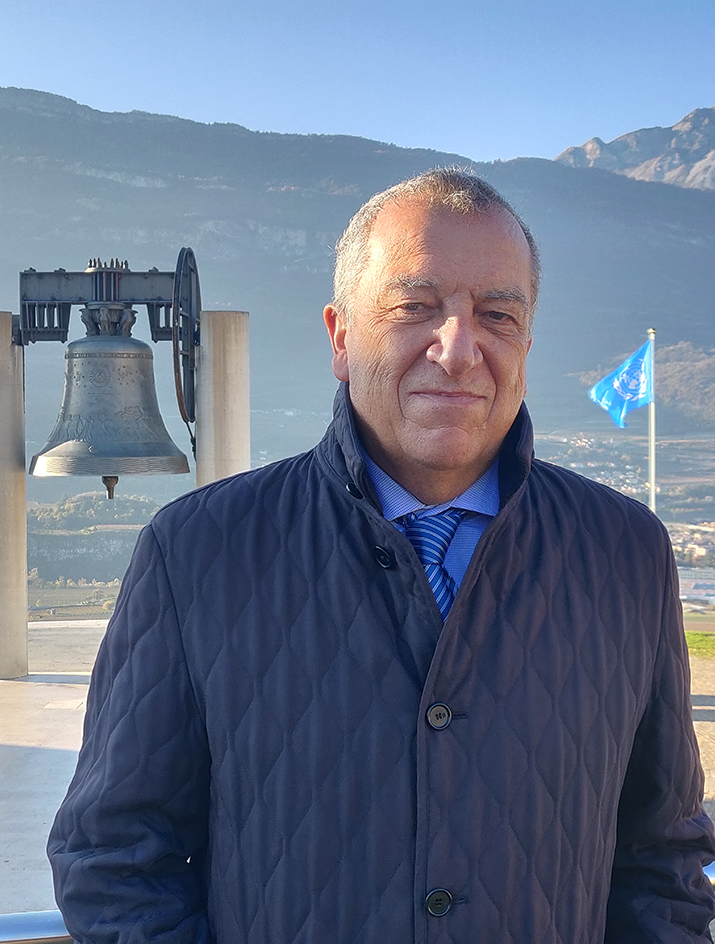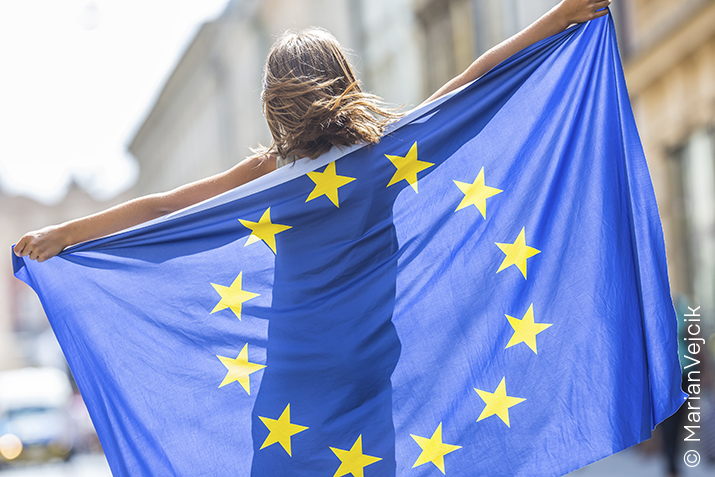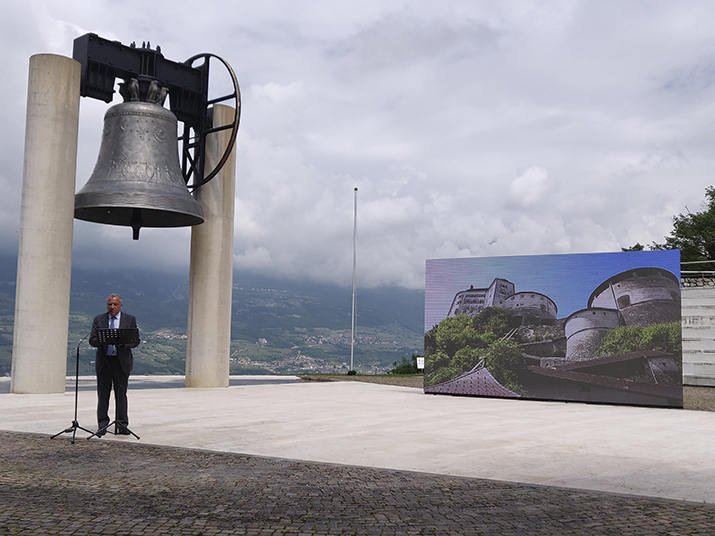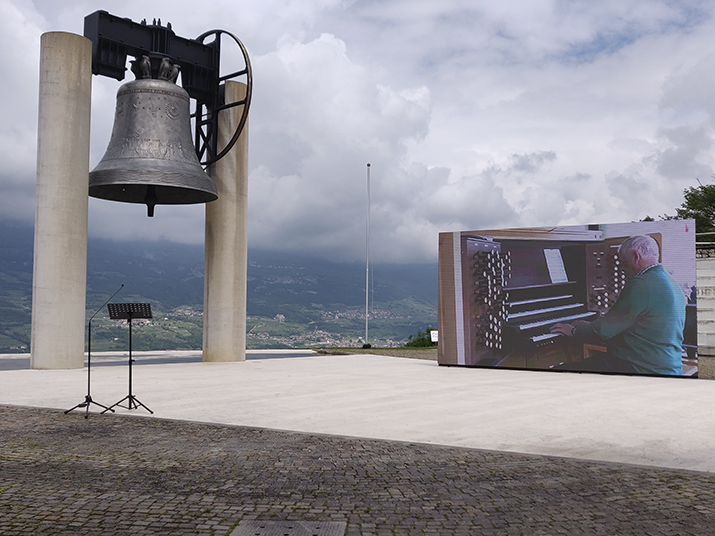As has been the case for some years now, on 9 May our Foundation celebrated Europe Day with a public ceremony with strong student participation, enriched on this particular occasion by an unprecedented video link with Kufstein, the city in the Austrian Tyrol with which Rovereto is united by a consolidated twinning relationship.
What follows is the speech I gave at the opening of the event.
«A very cordial good morning to all of you, both in Kufstein and in Rovereto, and a heartfelt thanks to the two institutions that made today's connection across the Alps possible, the Municipality of Kufstein with the Bürgermeister Martin Krumschnabel and the Municipality of Rovereto with Mayor Francesco Valduga.
I would like to recall here, even if it is a well-known fact, that the two cities have been united since 1998 by a dynamic twinning relationship which is enriched today by a new and significant event.
I would also like to thank the other authorities present, in particular the members of the Rovereto City Council and above all Professor Michele Nicoletti, professor at the University of Trento, former parliamentarian and former president of the Parliamentary Assembly of the Council of Europe.
His long-awaited speech will conclude the official part of our event.
I then extend an affectionate welcome to Annamaria Megalizzi, mother of Antonio, the brilliant young journalist from Trentino, an enthusiastic supporter and promoter of European ideals, who fell victim to a criminal episode of terrorism in Strasbourg at the end of 2018.
Lastly, I would like to mention the presence of a large group of students, engaged with their teachers in a day of study on the issues of today’s Europe, at Colle di Miravalle. They have come from as many as 6 countries (Austria, Bosnia-Herzegovina, France, Germany, Ireland, Spain) and within a few hours of getting to know each other already appeared perfectly integrated with their Italian peers.
Moving on to the meaning behind the celebration, today we are commemorating Europe's 73rd birthday, the so-called «Schuman Day», named after the then French Foreign Minister, Robert Schuman, who precisely on 9 May 1950 announced his initiative for the creation of a common space on our continent. A project formed by a process in various stages and increasing levels of integration, marked by many successes and some inevitable disappointments, which paved the way for the current European Union, with its 27 member states and 450 million inhabitants. An entity that from its creation to the present day has guaranteed its members peace, freedom, prosperity and high standards of democracy. Fundamental values that each of us should uphold but above all, not take for granted, based on the dramatic feedback provided by the media in relation to various territories, also those that are close to us.
Consequently, I consider it essential to celebrate the date of May 9 as European citizens, aware of our rights but also of our duties and making our own the message of two world-known symbols of peace, that is the Heldenorgel of Kufstein and the Rovereto Peace Bell.
Despite their diversity in appearance and sound, the vibrant universal call conveyed by both is identical, namely the need for states to base their relations on mutual respect and understanding. In fact, in the case of problems, dialogue and negotiations, and certainly not the use of force, must be the main ways to face the difficulties and resolve them with shared satisfaction».
So far, we have the commemoration at Colle di Miravalle, which coincided with two events of undoubted relevance in a wider European context. On 4 May, the foreign ministers of 9 member countries (forming a «Group of Friends», with the support of France, Germany, Italy and Spain among others) launched an unprecedented initiative, through a joint declaration, to reform the voting system within the EU, proposing to abandon the unanimity rule also for the crucial sector of foreign and security policy and to introduce the qualified majority rule.
From Strasbourg, the German Chancellor Scholz went even further in aid of Europe Day by including the sensitive tax matter in the auspicious new voting system.
Commenting on the aforementioned, it seems realistic to note that there is still a long way to go (the qualified majority requires the vote of 15 states representing 65 per cent of the EU population), also due to the obvious opposition of some (with Hungary and Poland predictably among those at the top of the list) to the abandonment of the "golden rule" of unanimity. On the other hand, it is now evident - as demonstrated beyond any possible doubt by the criminal Russian aggression of Ukraine - that within the current context of inter-state relations, Europe's maintenance of an adequate role in its history and its potential needs to transpire through the strengthening of its supra-national cohesion and the speeding up of internal decision-making processes.
Under the current system, these two objectives are not without constraints and all too often end up falling hostage to the "blackmail" of this or that member country, with purely nationalistic motivations.
Considering that, with the delays, uncertainties and reticence of the case, a top-down movement in favour of the need for "more Europe" seems to be envisaged at an institutional level, it is now certainly desirable to intensify a similar bottom-up phenomenon at the level of resident populations and civil societies. In short, a "pincer" operation, for once not associated with military manoeuvres for the conquest of territories or the destruction of infrastructures, but aimed at obtaining higher levels of democracy, freedom, respect for human rights and social solidarity. In the much smaller geographical context to which Rovereto and Kufstein belong, the initiative of 9 May aspires precisely to these objectives.
It is certainly not with a light heart that I conclude this editorial by mentioning the very recent visit to the vast flooded areas of Emilia-Romagna made by the president of the EU Commission, Ursula von der Leyen, in the company of Prime Minister Meloni also with the aim of evaluating the most appropriate forms of assistance that might be provided by the Brussels institutions.
«Europe is with you» the head of the Commission declared at the end of her visit with a sentence that lends itself to various interpretations, from a superficial involvement to effective solidarity. Faced with the immense extent of the devastation and the extraordinary reaction of the affected populations, who immediately set to work to restore "normal" conditions, I have no reason to doubt that the second hypothesis is the correct one
Reggente Marco Marsilli, Foundation President










